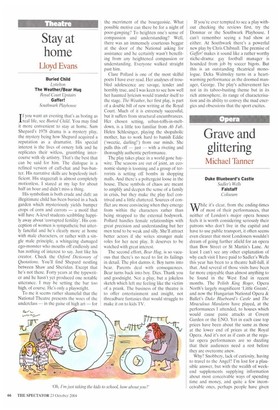Stay at home
Lloyd Evans
Burled Child Lyttelton The Weather/Bear Hug Royal Court Upstairs Gaffer! Southwark Pla_vhouse
If you want an evening that's as boring as real life, see Buried Child. You may find it more convenient to stay at home. Sam Shepard's 1978 drama is a mystery play, the mystery being how Shepard acquired a reputation as a dramatist. His special interest is the lives of ornery folk and he replicates their witless, grumbling intercourse with sly artistry. That's the best that can be said for him. The dialogue is a refined version of caff-chat and bus-banter. His narrative skills are hopelessly inefficient. His stagecraft is almost completely motionless. I stared at my lap for about half an hour and didn't miss a thing.
His symbolism is both crude and daft: an illegitimate child has been buried in a back garden which mysteriously yields bumper crops of corn and carrots — a motif that will have A-level students scribbling happily away about 'corrupted fertility'. His conception of women is sympathetic but utterly fanciful and he's clearly more at home with male characters, or rather with a single male principle, a whingeing damaged ego-monster who mouths off endlessly and has nothing of interest to say. Just like his creator. Check the Oxford Dictionary of Quotations. You'll find Shepard nestling between Shaw and Sheridan. Except that he's not there. Forty years at the typewriter and he hasn't yet produced one notable utterance. I may he setting the bar too high, of course. He's only a playwright.
To me it seems rather shameful that the National Theatre presents the woes of the underclass — in the guise of high art — for the merriment of the bourgeoisie. What possible motive can there be for a night of poor-gawping? To heighten one's sense of compassion and understanding? Well, there was an immensely courteous beggar at the door of the National asking for assistance and he certainly wasn't benefiting from any heightened compassion or understanding. Everyone walked straight past him.
Clare Pollard is one of the most skilful poets I have ever read. Her analyses of troubled adolescence are savage, tender and horribly true, and I was keen to see how well her haunted lyricism would transfer itself to the stage. The Weather, her first play, is part of a double bill of new writing at the Royal Court. Much of it is extremely successful, but it suffers from structural encumbrances. Her chosen setting, urban-toffs-in-meltdown, is a little too familiar from Ab Fab. Helen Schlesinger, playing the shopaholic mother, has to work hard to banish Eddie ('sweetie, darling!') from our minds. She pulls this off — just — with a riveting and thoroughly authentic performance.
The play takes place in a world gone haywire. The seasons are out of joint, an economic slump is looming and a group of terrorists is setting off bombs in shopping malls. And there's a poltergeist loose in the house. These symbols of chaos are meant to amplify and deepen the sense of a family in crisis, but they make the play feel contrived and a little cluttered. Sources of conflict are more convincing when they emerge from within the characters rather than being strapped to the external bodywork. Pollard handles female relationships with great precision and understanding but her men tend to be weak and silly. She'll attract better actors if she writes stronger male roles for her next play. It deserves to be watched with great interest.
The second effort, Bear Hug, is so vacuous that there's no need to list its failings in detail. The plot damns it. Boy turns into bear. Parents deal with consequences. Bear turns back into boy. Dies. Thank you and goodnight. Not a play, but a jokeless sketch which left me feeling like the victim of a prank. The business of the theatre is to offer entertainment and insight, not threadbare fantasies that would struggle to make it on to kids TV.
If you're ever tempted to see a play without checking the reviews first, try the Donmar or the Southwark Playhouse. I can't remember seeing a bad show at either. At Southwark there's a powerful new play by Chris Chibnall. The premise of Gaffer! makes it sound like a rather worthy niche-drama: gay football manager is hounded from job by soccer bigots. But this is an outstanding theatrical monologue. Deka Walmsley turns in a heartwarming performance as the doomed manager, George. The play's achievement lies not in its taboo-busting theme but in its rich atmosphere, its range of characterisation and its ability to convey the mad energies and obsessions that the sport excites.
























































































 Previous page
Previous page